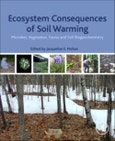Ecosystem Consequences of Soil Warming: Microbes, Vegetation, Fauna and Soil Biogeochemistry focuses on biotic and biogeochemical responses to warmer soils including plant and microbial evolution. It covers various field settings, such as arctic tundra; alpine meadows; temperate, tropical and subalpine forests; drylands; and grassland ecosystems. Information integrates multiple natural science disciplines, providing a holistic, integrative approach that will help readers understand and forecast future planetwide responses to soil warming. Students and educators will find this book informative for understanding biotic and biogeochemical responses to changing climatic conditions. Scientists from a wide range of disciplines, including soil scientists, ecologists, geneticists, as well as molecular, evolutionary and conservation biologists, will find this book a valuable resource in understanding and planning for warmer climate conditions.
Please Note: This is an On Demand product, delivery may take up to 11 working days after payment has been received.
Table of Contents
1. Reflections on 27 years of manipulated ecosystem warming in a subalpine meadow 2. A holistic view of the soil food web using community sequencing 3. Evolutionary consequences of climate change 4. Plant Reproductive Fitness and Phenology Responses to Climate Warming: Results from Native Populations, Communities and Ecosystems 5. Plant biochemistry impacts ecosystem responses to soil warming and drought 6. Effects of warming on fungal leaf endophytes: impacts on physiology, species richness, and composition 7. Microbial responses to experimental soil warming: Five testable hypotheses 8. Mycorrhizal mediation of plant and ecosystem responses to soil warming 9. The temperature sensitivity of soil carbon 10. The role of soil physical properties for determining biogeochemical responses to soil warming 11. Soil warming and winter snowpacks: Implications for northern forest ecosystem functioning 12. Soil Fauna and their Potential Responses to Warmer Soils 13. Responses of alpine plant communities to climate warming 14. Responses of grasslands to experimental warming 15. Soil warming effects on low-latitude forests with highly-weathered soils 16. Long-term warming research in high-latitude ecosystems: Responses from polar ecosystems and implications for future climate








